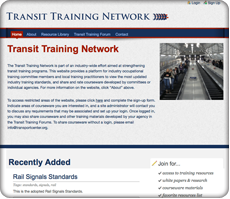News
Transit Apprenticeship at Pierce Transit: From the Ground Up
Posted September 2020
Back in the day, knowledge could easily be transferred from one manufacturer to another. Fast-forward to the 20th century - as technologies have accelerated at nearly the speed of light, systems have become increasingly complex and require extensive training and hands-on time to master them efficiently. Today, the carbureted bus engine is long gone. Turbo chargers are standard. Fuel injection, compressed natural gas, hybrid systems, and even new technologies such as all-electric battery-operated drivelines are here.
Transmissions used to work exclusively from vacuum and fluid pressure. Now, in addition to vacuum and fluid pressure, computer-controlled solenoids are incorporated as well. All systems are now directed inputs from a multiplexing Programmable Logic Controller (PLC), a system that continuously monitors the state of input from numerous devices throughout the bus and makes decisions based upon a customized program and complex algorithms to control the state of its output devices. Wiring harnesses have grown, from 3 to 4 wires, to wiring bundles as big as your wrist.
Fareboxes used to be basic mechanical “piggy banks”; now they have highly sophisticated computers with delicate inner workings. Climate control consisted of nothing more than a heater box, but are now equipped with complex digitally-controlled system. Fire suppression, vehicle tracking, radios, and others are in place and require regular maintenance and upkeep. Door systems are no longer just a simple mechanical linkage, but a highly orchestrated symphony of switches, valves, touch sensors and solenoids.
How does this translate for technicians in a shop? Laptops, and hand-held monitoring devices are now standard equipment littered within a technician’s toolbox. This is where the saying “apprenticeship is the OTHER four-year degree”, is entirely appropriate. Technicians employed today have been turning wrenches on these buses for 10, 20, or 30+ years. Our baby-boomer generation has now reached the retirement window. Each time these technicians clock out for their final working day, we lose much more than a set of hands. An entire library of information walks out the door and leaves a wake of knowledge a check cannot be written for.
Who is to fill their shoes? This is a situation that absolutely cannot be remedied quickly. Overtime is a band aid. Apprenticeship is also not a quick fix, and requires solid forward-planning to fill critical gaps when the workload becomes overwhelming. We must stand on the hill and look down into the valley to see the rewards with Apprenticeship, and the return on investment is multiplied substantially when the going gets tough. With a firm training plan, trainers/mentors build comprehensive knowledge needed to get the job done. Entry-level tasks lead to more complex challenges to build confidence and understanding of diverse systems on our buses. The Trainer draws upon their own experience, expresses concepts in terms the trainee can relate, and possesses a great deal of patience when breaking tasks down into small units and allowing time for the trainee to absorb the information. This training methodology encourages competency, team participation, pride in workmanship, and high quality “ownership” in the equipment provided to the customer(s).
Task qualification is a double-edged understanding from both the trainer and trainee. When the trainer signs the trainee off on a task, he/she is confident the trainee has reached a competency of that task to work independently. The trainee signs off the task acknowledging that competency, and also recognizing the responsibility bestowed upon them to complete that task in the future without assistance. Our 8,000-hour Washington State registered apprenticeship program operates at the speed and aptitude of the trainee. Some tasks may be comprehended in only a few minutes; others may take extensive hands-on time and/or additional formal training provided by either the trainer, manufacturer, or third-party commercial vendor.
Many systems on transit buses are much like computers and change from one model year to the next. This requires revolving training requirements to ensure technicians understand system updates and changes in operation. Failure to ensure these training needs are addressed can lead to premature wear of components, damaged or catastrophic loss of costly assemblies or beyond that – serious injury or death to our valuable personnel or customers. Accurate foresight and planning with a well-calculated investment in apprenticeship garners huge returns to fill voids in maintenance production down the road.
While many agencies grow their own mechanics from within, many do not possess the backing of a State or Nationally Certified program to validate the extensive training budding technicians endure. Pierce Transit is one of a growing number of agencies with bus maintenance apprenticeship providing an amazing opportunity to raise its own top-quality technicians of the future right in its lap.
Written by Brent Riffel, Maintenance Training Coordinator, Pierce Transit.
Pierce Transit is part of the Center’s transit apprenticeship initiative and has received technical assistance in structuring the program as well as financial assistance to reimburse some training costs. For information on Registered Bus Maintenance Apprenticeship, contact John Schiavone
